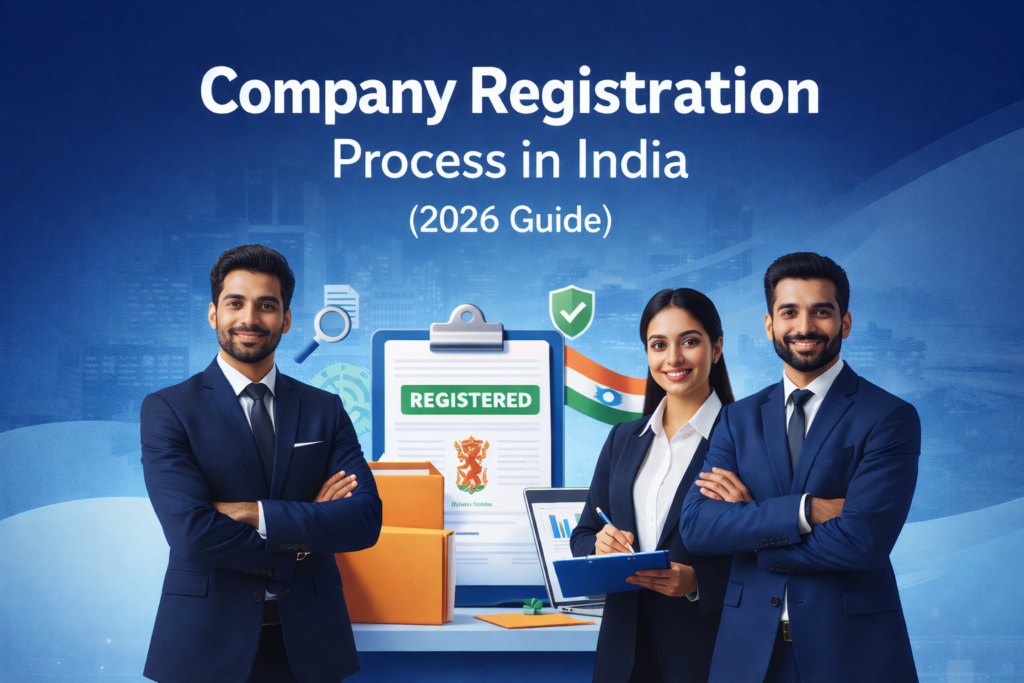Company Registration in India: A Complete Guide for Entrepreneurs by Bizsimpl

Starting a business is a significant milestone in any entrepreneur’s journey. Whether you’re launching a startup, scaling an idea, or formalizing a freelance operation, Company Registration is the first and most crucial step. Registering your company is not only a legal formality but also a strategic move that adds credibility, structure, and growth potential to your business.
In India, the process of Company Registration has been made simpler and more accessible through digital platforms and government reforms. However, understanding the various types of company structures, documentation, and compliance requirements is still critical. That’s where Bizsimpl steps in—as a reliable partner simplifying the end-to-end process of business registration for entrepreneurs across all Indian states.
In this comprehensive guide, we’ll walk you through:
- The importance of Company Registration
- Different types of company structures
- Step-by-step registration process
- Timelines and documentation
- Why Bizsimpl is your best choice for registration support
Why Company Registration Matters
Company Registration in India is more than a procedural obligation—it’s a foundational move toward building a legitimate, scalable business. Here’s why registration is essential:
1. Legal Identity and Recognition
Registering your business gives it a separate legal identity. It distinguishes you from your business entity, offering clarity in ownership, liability, and operations.
2. Limited Liability Protection
One of the biggest advantages of a registered entity, especially a Private Limited Company or LLP, is limited liability. This means your personal assets are protected if the business incurs any debts.
3. Credibility with Customers and Investors
A registered business appears more credible to customers, vendors, and investors. It demonstrates professionalism and commitment, which is critical when seeking funding or partnerships.
4. Access to Funding and Contracts
Most investors and financial institutions prefer or mandate dealing with registered companies. Also, many government tenders and corporate contracts require a registered entity to apply.
5. Perpetual Existence
Registered companies continue to exist beyond the lives of their founders. This ensures business continuity, which is particularly important for succession and long-term planning.
Types of Companies You Can Register in India
Choosing the right company structure depends on the nature of your business, future goals, and the number of stakeholders involved. The most common types under Indian law are:
1. Private Limited Company (Pvt Ltd)
A Private Limited Company is the most preferred business structure among Indian startups. It allows for limited liability, ease of ownership transfer, and capital raising.
Key Features:
- Requires minimum 2 directors and 2 shareholders
- Offers limited liability protection
- Eligible to raise equity funding
- Can issue shares and have shareholding agreements
- Ideal for growth-oriented startups
When to Choose: If you plan to raise external funding, scale operations, or build a corporate structure.
2. Limited Liability Partnership (LLP)
An LLP is a hybrid structure that combines the benefits of a partnership and a private limited company. It offers flexibility in management and limited liability.
Key Features:
- Requires minimum 2 partners
- Liability is limited to the agreed contribution
- No restriction on the number of partners
- Lesser compliance burden compared to Pvt Ltd
When to Choose: If you’re starting a small business or professional service firm and want low compliance but legal protection.
3. One Person Company (OPC)
For solo founders who want to operate as a company but don’t have a co-founder, One Person Company is the right fit.
Key Features:
- Single shareholder and director
- Limited liability protection
- Can be converted into a Pvt Ltd upon scaling
- Separate legal entity status
When to Choose: If you’re a solopreneur or early-stage founder who wants structure and protection without adding partners.
Step-by-Step Guide to Company Registration

The process of Company Registration in India has become smoother thanks to the Ministry of Corporate Affairs (MCA)’s digital interface. Here’s a step-by-step overview of how you can register your business.
Step 1: Choose the Right Business Structure
This is the foundation of your registration process. Whether it’s a Pvt Ltd, LLP, or OPC, the structure defines your compliance responsibilities and business flexibility.
Step 2: Apply for Digital Signature Certificate (DSC)
A Digital Signature Certificate is required for directors or partners to sign online forms securely. This is the first legal step in the registration process.
Step 3: Apply for Director Identification Number (DIN)
All directors need a DIN, which is a unique identification number issued by the MCA.
Step 4: Name Approval
You must submit a name approval request via the RUN (Reserve Unique Name) service. Your company name should be unique, compliant with MCA guidelines, and not infringe any trademarks.
Step 5: Draft Incorporation Documents
You’ll need to prepare and sign the Memorandum of Association (MOA) and Articles of Association (AOA), which outline the company’s objectives and rules.
Step 6: File Incorporation Application
Submit your incorporation application using the SPICe+ form, which integrates several services including PAN, TAN, EPFO, and ESIC registration.
Step 7: Certificate of Incorporation
Once approved, the Registrar of Companies (RoC) issues the Certificate of Incorporation, which includes your CIN (Corporate Identification Number).
How Bizsimpl Simplifies Company Registration
At Bizsimpl, we believe that entrepreneurs should focus on building their business, not navigating bureaucracy. Our efficient Company Registration services are designed to eliminate guesswork, reduce delays, and ensure full compliance right from the start.
Here’s how we help:
- Guidance on Choosing the Right Structure: Whether you’re unsure between a Pvt Ltd or an LLP, our experts provide tailored advice based on your business model and goals.
- End-to-End Documentation Support: From drafting incorporation documents to securing digital signatures, we handle it all.
- Fast-Track Filing: Our streamlined processes ensure quick and error-free filing with the MCA.
- Pan India Support: Register your business in any Indian state—Bizsimpl is equipped to handle state-wise compliance variations effortlessly.
- Compliance-Ready Setup: We ensure that your company is not only registered but ready to meet post-incorporation compliance requirements confidently.
Common Mistakes to Avoid During Company Registration
Even though the process of Company Registration in India has become more streamlined, many first-time entrepreneurs make avoidable mistakes that can delay or complicate the process. Here are some key pitfalls to steer clear of:
1. Choosing the Wrong Business Structure
Many entrepreneurs rush into the registration process without evaluating which structure is most suitable—Pvt Ltd, LLP, or OPC. Making the wrong choice can lead to regulatory burdens or limitations in the future. Bizsimpl helps ensure you make the right decision from the start.
2. Unclear or Conflicting Company Name
Submitting a name that is too similar to an existing business or includes restricted terms can lead to rejections during the approval stage. A proper name availability check is critical.
3. Incomplete or Incorrect Documentation
Incorrectly filled forms or missing supporting documents can cause delays or rejections from the Ministry of Corporate Affairs. Bizsimpl ensures all documentation is cross-verified and compliant.
4. Not Planning for Future Compliance
Many founders focus solely on getting their company registered, without understanding the future compliance obligations associated with their chosen structure. At Bizsimpl, we ensure your registration sets you up for long-term compliance success.
Timelines for Company Registration
The average timeline for Company Registration in India can vary slightly depending on the type of entity and the accuracy of submitted documents. Here’s a general breakdown:
| Step | Duration |
|---|---|
| Digital Signature (DSC) | 1–2 working days |
| Director Identification Number (DIN) | 1–2 working days |
| Name Approval | 2–3 working days |
| Company Incorporation (SPICe+) | 3–5 working days |
| Certificate of Incorporation | 5–10 working days total (end-to-end) |
Bizsimpl’s optimized filing and tracking process ensures faster turnaround, especially for founders with tight timelines.
Comparison Table: Pvt Ltd vs LLP vs OPC
Choosing the right company structure is vital. Here’s a quick comparison to help you decide:
| Feature | Pvt Ltd | LLP | OPC |
|---|---|---|---|
| Ownership | Minimum 2 Shareholders | Minimum 2 Partners | Single Owner |
| Legal Entity | Separate | Separate | Separate |
| Liability | Limited | Limited | Limited |
| Fundraising Potential | High | Low | Moderate |
| Compliance | Moderate to High | Low to Moderate | Low |
| Ideal For | Startups & Tech Companies | Professionals & Small Firms | Solo Entrepreneurs |
Bizsimpl’s expert advisors walk you through this decision with clarity and insight, so you don’t have to make this choice alone.
What to Do After Company Registration
Registering your company is a major milestone, but it’s only the beginning. Once your company is incorporated, you need to take a few additional steps to ensure smooth operations:
1. Open a Business Bank Account
Using your Certificate of Incorporation, PAN, and other documents, open a business current account for all transactions.
2. Create an Accounting System
Even at an early stage, tracking your finances is essential. Choose a basic accounting tool or service to manage this from Day 1.
3. Comply with Registrar of Companies (RoC) Filings
Depending on your company type, you may need to file annual returns, maintain registers, and submit financial statements. Bizsimpl can help set up a compliant structure during registration itself.
4. Issue Share Certificates
For Pvt Ltd companies, issuing share certificates to shareholders is a mandatory step post-incorporation.
5. Draft a Founders’ Agreement
For companies with multiple founders, a Founders’ Agreement can help clarify roles, responsibilities, and equity distribution. Though not legally required, it’s a wise move for long-term harmony.
Why Entrepreneurs Trust Bizsimpl for Company Registration
With countless platforms offering company registration services, what makes Bizsimpl stand out?
1. Business-First Approach
We don’t just register companies—we help build sustainable businesses. Every step we take is aligned with your long-term goals.
2. Pan-India Expertise
Whether you’re in Bangalore, Delhi, Mumbai, Chennai, or a Tier-2 city—Bizsimpl offers uniform excellence in Company Registration support.
3. Dedicated Account Management
We assign you a dedicated professional to guide you through every step—from selecting the right structure to document finalization and form submission.
4. Speed + Accuracy
By combining automation with expert review, we minimize errors and accelerate approval timelines, ensuring your business becomes official without delay.
5. Founders-Centric Philosophy
We understand the mindset of Indian entrepreneurs and tailor our services accordingly. Our team is trained to think like founders—lean, practical, and forward-looking.
Final Thoughts
Company Registration is not just a box to check—it’s a strategic investment in your future. It lays the groundwork for credibility, scalability, and compliance. Whether you’re building a tech startup, a consulting firm, or a solo venture, registering your business is the first real step toward making your vision a reality.
With Bizsimpl, that journey becomes easier, faster, and stress-free. We take care of the paperwork, timelines, filings, and formalities—so you can focus on building your dream.
Ready to Make Your Business Official?
Let Bizsimpl help you register your company with ease. Whether you choose a Private Limited Company, Limited Liability Partnership, or One Person Company, we’ve got you covered—across every Indian state.
#CompanyRegistration #StartABusiness #Bizsimpl #PvtLtd #LLP #OPC #BusinessInIndia #EntrepreneurshipIndia #StartupIndia
Blog's
Company Registration in Bangalore with BizSimpl Consultancy
Company Registration in Bangalore: Step-by-Step Guide for Startups Company Registration in Bangalore is the first…
Process for Registering a Company in India: Step-by-Step
On This Page What Company Registration Means End-to-End Registration Process Overview Types of Company Structures…
Startup Incorporation in India: Essential Steps and Benefits for New Entrepreneurs
Startup Incorporation in India: Essential Steps and Benefits for New Entrepreneurs India has quickly developed…










